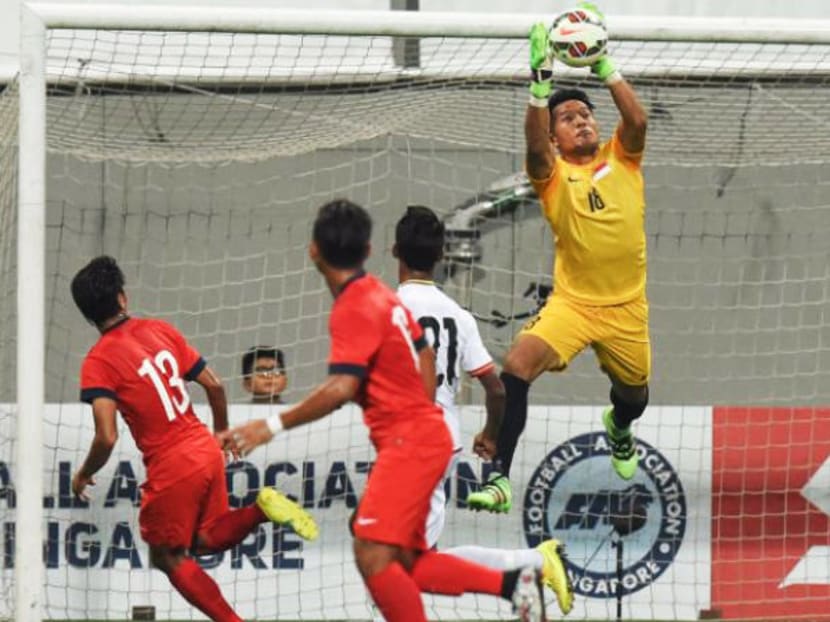Thai league opens door to Singapore footballers
SINGAPORE - Top Singapore footballers will now have more opportunities to ply their trade overseas after the Thai Premier League (PLT) football clubs voted last week to accept a new rule to include a ASEAN player quota.

Hassan Sunny (in yellow) is currently the only Singaporean who is plying his trade in the Thai Premier League, considered the best professional football league in the region. TODAY FILE PHOTO
SINGAPORE - Top Singapore footballers will now have more opportunities to ply their trade overseas after the Thai Premier League (PLT) football clubs voted last week to accept a new rule to include a ASEAN player quota.
Under the new regulation announced by the Thai Football Association, all Thai Premier League and Division 1 clubs will be allowed to register three foreign players, one Asian player and one ASEAN player from next year.
This season, clubs are allowed to register four foreign players and one Asian player.
The new regulation applies to players from Thailand’s nine ASEAN neighbours - Brunei, Cambodia, Indonesia, Laos, Malaysia, Myanmar, Philippines, Singapore, and Vietnam.
“I’m glad that the proposal was accepted and approved in the League’s meeting with the clubs. This really opens the door to the region’s best players - including Singapore - to test themselves in the Thai Premier League,” said PLT’s Deputy CEO Benjamin Tan, a Singaporean.
“As a professional league, we need to constantly produce commercially attractive content for stakeholders and increase fan engagement.”
Tan, who was the Football Association of Singapore’s former deputy director of development and planning before he joined the PLT, added: “The benefits are multi-fold. We believe that by attracting the regional’s best players into Thai League, this rule will develop football in the country, makes economic and commercial sense, connects regional fans and promote Thai football.”
Currently, each of the 18 PLT and 16 Division 1 clubs are allowed to register five foreign players in their squad, of which at least one must be a player from an Asian country.
Under the proposed changes for next season, out of the five foreign players one must be from an Asian country and another must be from South-east Asia. While this regulation is optional for the clubs next year, it will be made mandatory from the 2018 season onward.
This means players from Singapore and neighboring ASEAN countries such as Indonesia, Malaysia, the Philippines and Vietnam will have more opportunities of playing in Thailand.
Widely regarded as the best professional football league in the region, the PLT enjoys sell-out crowds regularly, with big games attracting more than 25,000 fans.
And the prospect of playing on such a stage has filled some Singapore footballers with excitement.
“It's definitely good for us (players) if we can play in Thailand because their standard of football is getting better every year," said national defender Madhu Mohana. "You can see how good their national team is now, and many of them play in the Thai Premier League, so naturally the quality of football in the league is very high.
"So if we do manage to get to play in one of the Thai clubs, I'm sure we'll be able to learn a lot from them and improve individually as players, especially as they like to play a high-tempo, one-touch passing style of football. The players need to be comfortable in playing that style if Singapore football is to progress."
Agreeing, national midfielder M Anumanthan said playing in Thailand is something that he hopes to do one day, and believes most players will be using this year's Suzuki Cup as a platform to showcase their talent to the Thai clubs.
"As a player, I have dreams and aspirations to play abroad, and if the opportunity came up to play in Thailand, of course I would love to take it," said the 22-year-old. "But not only me, I'm sure the rest of the players from the Asean region would want to try their luck in Thailand.
"So this year's Suzuki Cup will be a great platform for us to show the Thai teams what we're capable of...it raises the stakes and will give us more motivation to work even harder in the tournament."
Currently, the only Singaporean player to ply his trade in Thailand is national goalkeeper Hassan Sunny, who currently plays for PLT outfit Army United. Having seen first-hand the high standard of football that Thailand offers, he hopes Singapore's players will seize any opportunity to play in the country should it be offered to them.
"It's a completely different level here in Thailand, not only in the PLT but also in Division 1," said Hassan, 32. "So if there's a chance for any Singapore player to join a Thai club, I would recommend that they do so.
"But some of our players are in their comfort zones, and I'm not sure if they'll be willing to sacrifice their life and time to come over here. It's a different life here, and it wasn't easy for me to adapt even though I was based in Bangkok. I can imagine if the clubs from rural areas come calling, it could be harder for our players to say yes to them because it could be tough for them to stay in a place without the usual comforts of the city.
"However, I really hope they don't think about that. It's all about the football, and that is the reason why I decided to sacrifice a lot of things to come here to play.
"If you play at a higher level, with a higher level of professionalism as well, you'll come back a better player for sure, and this will be fantastic for Singapore football."





